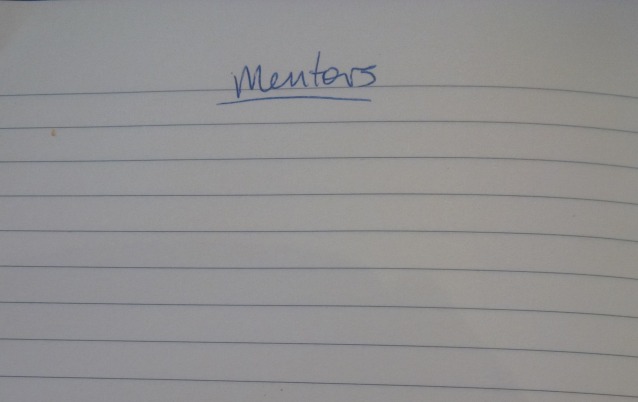I make a lot of lists. It’s an old habit that started when I was in grade school. Lists of to dos, lists of goals, lists of workouts. Lists, lists, lists. I’m also a nostalgic person and so I tend to save a lot of these lists and use them as touch points for storing memories and keeping track of the passing of time. Every now and then I’ll come across an old list and re-read it. Some of them make me think deeply and others make me laugh at my younger self’s absurdity.
Recently, I came across a list in my desk labeled simply “Mentors”. I’ve had a lot of mentors in my life – many who may not even know they played this role for me. I’ve always kept an eye on them and noticed the choices they’ve made and how they’ve carried themselves personally and professionally. A number of years ago, I drew up a list of my mentors as it helped crystallize for me who I admire, why I admire them and what I can learn from them. It was fun to stumble upon that list again and reflect on my choices.
Then, I read an interview with my friend Barb Goose, president of Digitas, where she talks about reverse mentors. It inspired me to draw up another list.
Reverse mentors are people younger than you who you admire and learn from. Everyone on my mentors list is older than me. That was my traditional definition of mentor – someone ahead of you in life that inspires you, helps guide you and show the way to live.
But when I read Barb’s reason for seeking out reverse mentors – younger folks who she learns from in this rapidly changing, digital world – it really resonated with me. Entrepreneurship, technology and innovation are profoundly influenced by the young. If you’re not tapping into their knowledge base and seeking their insight on trends and opportunities, you’re missing out on a valuable resource. Upon reflection, it’s one of the reasons I so much enjoy the teaching I do at Harvard Business School. I learn a tremendous amount from the students and they are always helping me think about the latest disruptive ideas, technologies and companies that are emerging or challenging how to best go about building start-ups to tackle these opportunities.
So now I’ve got my reverse mentor list. I’m tucking it away in my desk for another
few years and look forward to tracking the careers and choices of those on it.


Fantastic idea… contrarian, but there is definitely something there 😉
LikeLike
I feel your definition of “reverse mentor” is wrong. You say, “Reverse mentors are people younger than you who you admire
and learn from.” However, the true definition should read something to the effect of what Barbara Goose said:
“reverse mentor, meaning, I’m sure there are things hopefully I can teach her, but she teaches me a whole lot more.”
This definition resembles something more closely to what “bfeld” said in the comments below:
“‘peer relationships’ – where the mentor and the mentee learn from each other.”
I have never thought as mentoring as a one way street. A mentor is someone who you admire and can learn from regardless of relative age. I think the term “reverse mentor”, the way you use it, makes it sound derogatory to the people younger than me whose career, knowledge, or skill-set I have a respect for. As an entrepreneur, it is necessary for me to build a strong network of trusted people that can work with me and/or advise me, especially in fields of expertise that I consider myself weak in. I know that there are people in my generation and older still getting use to the idea of having a mentor that is younger, but do not confuse that with having a “reverse mentor,” because I have reverse mentors who are both younger and older than me.
LikeLike
What a refreshing concept! Not an easy relationship for an insecure C-Level employee but so necessary to stay sharp.
LikeLike
Reverse Mentors = Ideas + Insight + Feedback
Reverse mentoring is very important.
I have always wondered why big companies don’t have a group of young people to act as board of advisors to the board and senior management.
Most of the board of directors are over 50 and senior management are over 40. Imagine if these board of directors and senior management have reverse mentors.
Reverse mentors can give them a lot of ideas, insight, and feedback.
http://www.twitter.com/ninan99
LikeLike
This is really great. It’s so true, and what’s especially funny about it is that often times the “reverse mentor” may think of you as a mentor (though you’ve learned as much from them as vice versa). I can instantly think of a number of folks from my past who are reverse mentors to me and who have stuck with me for years even after our lives / careers have gone in different directions.
LikeLike
What % of VC’s would you say actively seek out these type of people?
LikeLike
Not sure I can give you a % here – but good question to ask others!
LikeLike
“Ben Zoma would say: Who is wise? One who learns from every man.” [Ethics of the Fathers, 4:1]
LikeLike
Yes! Very true. Mentoring is not a one-way street anymore. You’ve got to leave room for the learning to come back to you.
LikeLike
I love the phrase “reverse mentors.” I’ve long believed the best mentor relationships are “peer relationships” – where the mentor and the mentee learn from each other. I know my best experiences as a mentor have been when I’ve learned as much – or more – from the mentee.
LikeLike
Thanks, Brad. I agree. E.g., I learn tremendously from the entrepreneurs I work with and invest behind as peers, just as I try to help them learn from my experience.
LikeLike